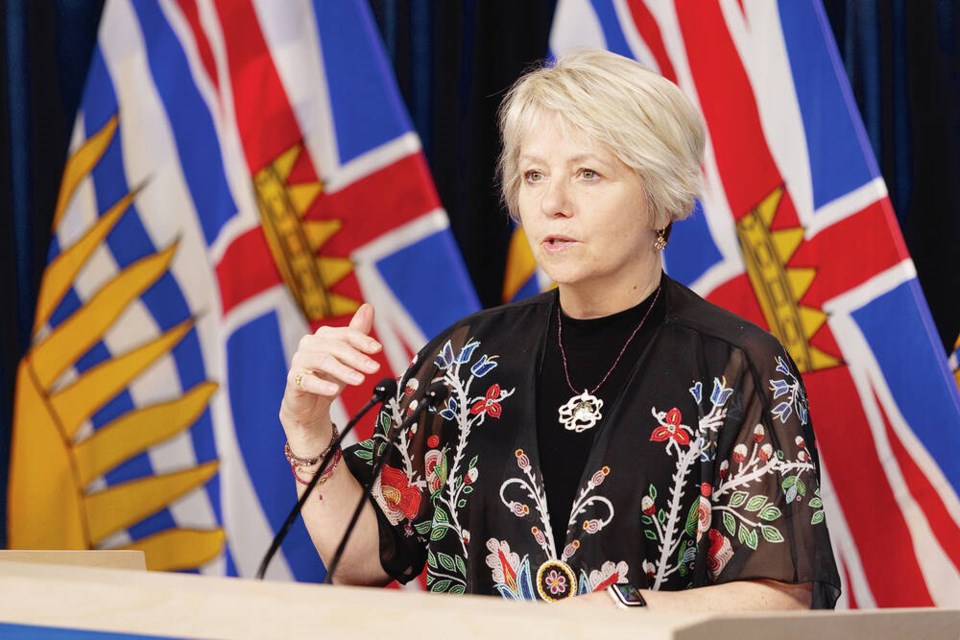COVID-19 infections, hospitalizations and deaths are down in B.C. but other respiratory illnesses are on the increase as the holiday season approaches, says provincial health officer Dr. Bonnie Henry.
The doctor who led the province through the worst of the pandemic was back at the podium on Monday encouraging more people to get their COVID and flu vaccines with the expectation that respiratory illnesses will peak in late December and early January.
“At this point in time, COVID seems to be low, steady, hasn’t gone away, but in the next few weeks, we’re going to see more influenza,” said Henry.
“Now is the time when we can take preventive measures to try and stop that peak.”
One hundred and eighty-two people with COVID-19 infections are in hospital — down from 330 in the first week of October — and 17 are in critical care. Infections and deaths are also down.
Cases of the influenza strain H1N1 and respiratory syncytial virus (RSV) are both rising, with children testing positive for RSV in high numbers. There are also other cold viruses circulating, including adenovirus and enteroviruses and para influenza.
Henry asked people to get immunized before Christmas to better protect themselves, family and especially vulnerable people over the holiday season. The updated COVID-19 shots containing the XBB strain are meant to train a person’s immune system to recognize the slightly different strains that are circulating right now.
Henry also suggested that those who develop a cough, runny nose, fatigue and especially a fever stay home or postpone holiday parties or other plans.
“A fever is generally an indication that you have something that may be transmissible to others,” she said.
As of Sunday, more than 1.4 million influenza vaccines and almost 1.3 million updated COVID-19 vaccines have been administered in B.C., said Henry. The province has received 2.3 million doses of influenza vaccine and more than 2.6 million doses of COVID-19 vaccine.
B.C. Health Minister Adrian Dix said B.C. is slightly ahead in COVID-19 vaccinations from the same time last year and “slightly behind” in flu shots. Nationally, B.C. is far ahead of other provinces, with twice the level of COVID-19 vaccinations as Ontario, he said.
“We are doing better than everywhere else, but that doesn’t help you if you haven’t been vaccinated,” said Dix. “It’s important to take this opportunity to do so.”
In some health authorities, appointment availability is at 90 per cent, he said.
Another reason for vaccination, said Dix, is a “record period of demand for health-care services in B.C.” There are more than 10,000 people in hospital beds in the province. Last January saw a peak of 10,280 people in hospital.
“We are approximately 170 above where we were last year right now,” said Dix. “So if that pattern were to be maintained, we would be seeing record numbers of people in hospital.”
Henry is asking people over 80 and those clinically extremely vulnerable, especially, to “book your shot today.”
“We know that over half of people over age 65 have gotten both their vaccines, but there’s still a risk out there for many,” said Henry.
Henry said 2023-2024 is a transition year with infectious-disease experts not yet sure of the path the SARS-CoV-2 virus will take.
In past years, there’s been a resurgence of COVID infections in the spring, while a typical influenza pattern is a peak in the winter.
Henry imagines that in future, the COVID vaccine will be offered on a periodic basis, “whether that means yearly or every couple years.” She noted the virus is not changing as fast as it was previously, partly due to high immunity.
The fact that it’s the H1N1 flu strain that is more widely circulating is good news for seniors, because the H3N2 strain — which is also circulating — is “especially problematic” for older people.” However, H1N1 causes more severe illness in young people, she said.
Henry said health officials are continuing to watch for any increase in an atypical pneumonia caused by a bacteria called Mycoplasma pneumoniae. Children have become ill with the bacteria in China, and there have been “sporadic” cases in B.C., but no increase “above what we would normally see,” Henry said.
“We’re not seeing a concerning increase in this type of pneumonia in B.C. and we’ll continue to watch for it.”




